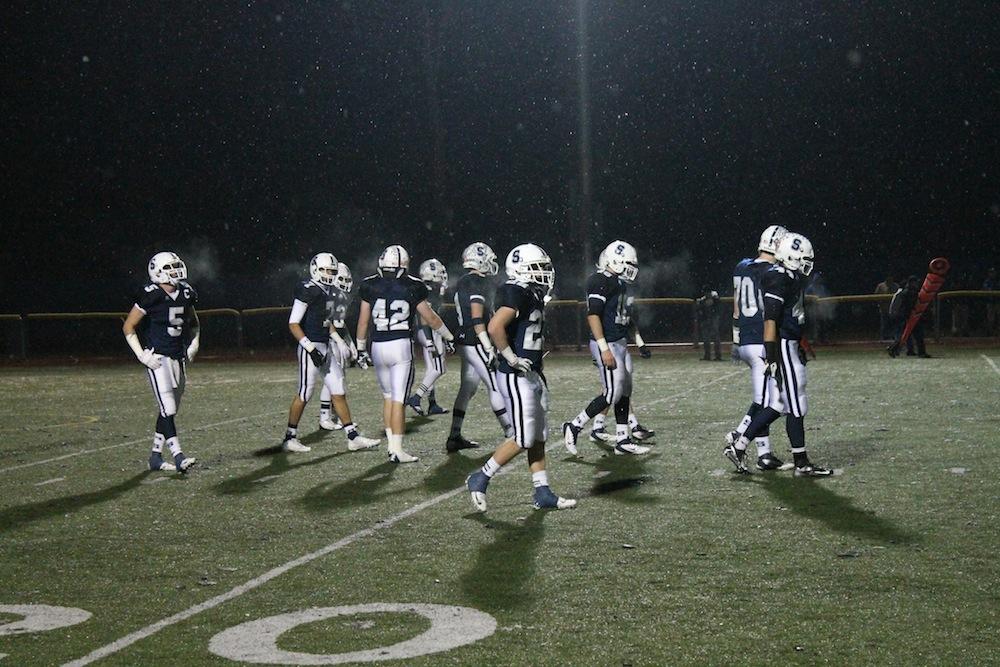It’s mid-July at Staples stadium. The orange morning sun glows yellow around its edge, radiating against the artificial turf. Empty metal bleachers pack heat in each bench, light shining too bright to look at for too long.
Suddenly, the benches rattle. A chorus of metal cleats hitting cement steps echoes throughout the stairwell leading down to the field. Incompletely padded, 250-pound behemoths lumber towards the gate, helmets in hand.
At 101 degrees Fahrenheit, and even hotter on the turf, the football players shield their water bottles under the bench—the only shade they have on the open field. Out alone in the blazing dog days of summer, the Staples football team runs training camp.
“Some days were almost unbearable,” captain Peter Bonenfant ’11 said. “The temperature would often be over 95 degrees, and then including the heat that the turf absorbs, it would feel as though we were running in temperatures over 100.”
Those extreme conditions are exactly what caused Tommy Aldrich ’14, among others, to leave the sport. In national news this summer, there were a handful of incidents involving heat-related deaths for players and coaches during the summer football workouts. Also, for Aldrich, waking up at5:45 a.m.was a tough task.
“I went to every summer workout—four, sometimes five days a week,” Aldrich said. “The workload did affect my decision not to play anymore, but I don’t have blame for the coaches. It was a decision I made.”
For Head Coach Marce Petroccio, the summer workouts are a part of the football regimen that holds great importance.
“The expectation here is you have to participate in these workouts,” Petroccio said. “The risk of injury if you don’t participate is just too high.”
Petroccio said the main focus of these summer workouts can be broken into three parts: flexibility, endurance, and agility. The coaches approach this player development, according to Petroccio, with caution and research.
The coaches use tactics engineered by theUniversityofIllinoisand theUniversityofConnecticutto implement their own summer program. According to Petroccio, the average workout is four days a week and consists of about 45 minutes of outdoor conditioning, followed by an hour of weight training.
Football isn’t the only sport that trains during the summer. According to Boys’ Cross Country coach Laddie Lawrence, the summer months are especially important for the team.
“The main idea behind the program is to establish a strong cardiovascular base through running hundreds of miles during the summer months,”Lawrencesaid. “It is commonly known among all high school runners and coaches that the two most important words in a cross-country training program are July and August.”
The girls’ soccer team shares this belief in the importance of summer conditioning in order to be prepared for the fall season.
“Being fit is the base of the sport, and soccer practices should be devoted to improving this fitness or maintaining it, not starting from scratch,” said team captain Shannon Lesch ’12 in an email interview.
Lawrence, as well as being concerned with the benefits his runners get over the summer, also keeps an eye on his players’ health—a concern he, Petroccio and other coaches share.
“We wouldn’t come out on the first day and make the kids do something so strenuous they would get sick,” Petroccio said. “We are extremely cognizant of the conditions, and based on the weather we will change what we do on any given day.”
Petroccio said that if the weather, hits triple digits, the team will make its way into the field house to try to escape the heat, if for only a little while. Player health, is his number one priority.
“In the 19 years I’ve been coaching here we have not seen a player suffer from heat exhaustion,” Petroccio said. “One football-related death is one death too many.”
Head Athletic Trainer Deiso Gaetana is in agreement with Petroccio.
“I can’t remember any real heat illness situation past mild heat cramps,” Gaetana said. “The coaches do a really good job keeping the kids safe in the heat.”
Soccer captain Lesch said she has never suffered from heat stroke though there are times when girls need a break. “Of course, when this happens, they are encouraged to take a break and drink water/get in the shade until they are feeling better.”
According to Gaetana, there are three stages of heat illness. The first, and least severe, is heat cramps. The next most severe is heat exhaustion, where the body becomes flushed, and the patient is thirsty and sweating. The most severe of the three is heat stroke, which can be deadly. The sweating ends, and in its place the patient becomes cool and clammy. Symptoms of this stage are vomiting, dehydration, and inconsistent consciousness.
“If it ever got to that level, it would require immediate hospitalization and a call to 911,” Gaetana said. “But thankfully we’ve never had a really horrible situation.”
However, according to Gaetana and Petroccio, if players exhibits any of these symptoms they are sat down for the rest of the day.
“If for any reason you begin to feel weak, take yourself out of the drill,” Petroccio said. “We don’t want any heroes here.”
To avoid any players feeling weak, the coaches give lots of water breaks during the practice, and if a day is particularly hot, they will wet down the turf before the players take the field. Although these actions may sound trifling, Petroccio insists that they are well worthwhile.
“We take every precaution we can possibly imagine,” Petroccio said. “It behooves us to get these kids into great shape. It only hurts us if we work them so hard it does damage.”
“I’ve been on the team for three years, and I’ve never seen anyone come close to a heat stroke,” Bonenfant said. “Our coaches push us to our limit, but they know what they are doing and give us plenty of time to rest and drink water.”
Each year, to better the protection against the summer weather, Gaetana talks to players about nutrition and other ways to avoid heat illness. She says its the best method of precaution. “The knowledge is basically going to protect everybody,” said Gaetana.
When she tends to the players on the sidelines in extreme conditions, Gaetana also prepares ice towels and extra water, just in case. According to her, the preparedness of the Staples system has been the main factor in how they’ve been able to prevent anything too serious.
“When we first began conditioning in the summer, the workouts took a huge toll on us physically and mentally,” Bonenfant said. “But as we continued through the summer we got better and better every single day.”
And to Petroccio, that’s the bottom line.
“We’re extremely proud of the fact that in this day and age, where everyone wants quick and easy, this is one place where you have to work to gain your benefits,” Petroccio said. “But at the end of the day, the benefits you reap are unparalleled.”














































